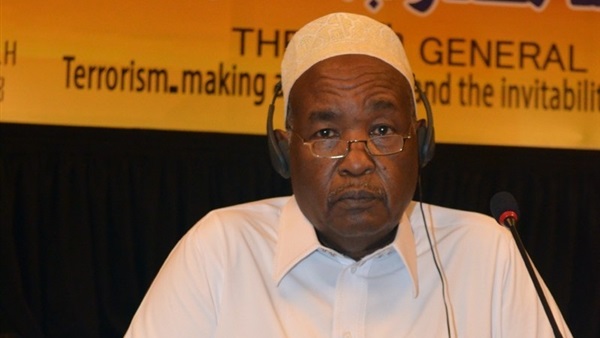SUPKEM chief: Terrorism is arch-enemy of Egyptian, Kenyan arms

Being a neighbouring country to Somalia, Kenya has being targeted by several terrorist
attacks since 1998, when al-Qaeda-linked militants bombed the U.S. embassy in
Nairobi, killing a total of 213 people. Since then, Muslims in Kenya have a
heavy responsibility to combat the extremist ideology.
The reference conducted an interview with
Chairperson of the Supreme Council of Kenya Muslims (SUPKEM) Yusuf Nzibo.
“Extremism is a global issue. It should not be
confined to a particular religion or a gender,” Nzibo said, emphasising that
the extremist ideologies, which push the youth to join the armed militant
groups, should be addressed on all levels, not only the military or security
ones.
The SUPKEM is monitoring all misinterpreted and
misused Islamic rules that affect the youth to tackle them and to renew the
religious discourse, Nzibo said. He called upon all governments, Imams and
clergymen, and tribal leaders to unify against the extremist ideologies, which
distort the image of Islamic religion since the militants commit violence in
the name of Islam.
“The council has spared no efforts concerning this
issue,” he said. It held a meeting for all Islamic institutions and parents,
whose sons and daughters joined militant groups, to agree on a unified strategy
for countering terrorism ideologically, Nzibo continued. All attendants have
signed an agreement on this strategy, he said.
“We have addressed the government to grant a pardon
for the youth who joined extremist groups in case that they turned themselves in,
in order to open the door for them to return from areas of conflict and for
refuse such ideologies to have normal lives,” he said.
Despite the fact that Muslims represent 20 percent
of the Kenyan population, they cannot face these ideologies alone; countering
terrorism should be on several areas, not on on the Muslims’ one, Nzibo added.
The SUPKEM chairperson also expressed his
appreciation and respect to Egypt’s Al-Azhar Institutions and the Egyptian
Ministry of Awqaf (Endowments) as they represent the moderate Islam. Azhar has
a great role in maintaining stability in Africa for many years, he said.
Members of the council have visited Egypt to sign an
agreement with al-Azahr to provide scholarship for Kenyan Imams and preachers
in Kenya and to send Azhar scholars and professors of all fields to Kenya, he
continued.
Militarily, Nzibo emphasised his full support to the
Egyptian army’s ongoing counter-terrorism military operation “2018 Sinai”.
Similarly, the Kenyan army has made a significant
progress, in cooperation with African Union forces, which deployed in Somalia
to stop militants’ infiltration into Kenyan territories. The last attack in
Kenya was a group of militants stormed Garissa University and killed 147
students on April 2015.
Kenyan army is now controlling a Somali maritime
port, through which militant groups get their ammunition and supply.
“The greatest problem boils down to the Kenyan
youth, who have been affected by the extremist ideas, even if they do not carry
weapons. But they see that murder and killing committed by the militants is a
“real Jihad and defending the religion”. And that is untrue,” Nzibo said.
About 8 million people of overall population (48
millions) in Kenya are Muslims. Their majority - from Indian and Pakistani communities- live in the coastal cities of Lamu, Malindi,
Mombasa, and Nairobi.
Islamic bodies and charities in Kenya are working on
spreading the Islamic teachings and Sharia sciences after many converted to
Christianity due to the evangelistic campaigns.







